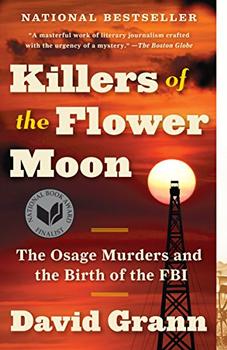Summary | Excerpt | Reviews | Beyond the Book | Readalikes | Genres & Themes | Author Bio

Critics' Opinion:
Readers' Opinion:
First Published:
Apr 2017, 352 pages
Paperback:
Apr 2018, 352 pages
 Book Reviewed by:
Book Reviewed by:
James Broderick
Buy This Book
Gray Horse was one of the reservation's older settlements. These outposts—including Fairfax, a larger, neighboring town of nearly fifteen hundred people, and Pawhuska, the Osage capital, with a population of more than six thousand—seemed like fevered visions. The streets clamored with cowboys, fortune seekers, bootleggers, soothsayers, medicine men, outlaws, U.S. marshals, New York financiers, and oil magnates. Automobiles sped along paved horse trails, the smell of fuel overwhelming the scent of the prairies. Juries of crows peered down from telephone wires. There were restaurants, advertised as cafés, and opera houses and polo grounds.
Although Mollie didn't spend as lavishly as some of her neighbors did, she had built a beautiful, rambling wooden house in Gray Horse near her family's old lodge of lashed poles, woven mats, and bark. She owned several cars and had a staff of servants—the Indians' pot-lickers, as many settlers derided these migrant workers. The servants were often black or Mexican, and in the early 1920s a visitor to the reservation expressed contempt at the sight of "even whites" performing "all the menial tasks about the house to which no Osage will stoop."
Mollie was one of the last people to see Anna before she vanished. That day, May 21, Mollie had risen close to dawn, a habit ingrained from when her father used to pray every morning to the sun. She was accustomed to the chorus of meadowlarks and sandpipers and prairie chickens, now overlaid with the pock-pocking of drills pounding the earth. Unlike many of her friends, who shunned Osage clothing, Mollie wrapped an Indian blanket around her shoulders. She also didn't style her hair in a flapper bob, and instead let her long, black hair flow over her back, revealing her striking face, with its high cheekbones and big brown eyes.
Her husband, Ernest Burkhart, rose with her. A twenty-eight-year-old white man, he had the stock handsomeness of an extra in a Western picture show: short brown hair, slate-blue eyes, square chin. Only his nose disturbed the portrait; it looked as if it had taken a barroom punch or two. Growing up in Texas, the son of a poor cotton farmer, he'd been enchanted by tales of the Osage Hills—that vestige of the American frontier where cowboys and Indians were said to still roam. In 1912, at nineteen, he'd packed a bag, like Huck Finn lighting out for the Territory, and gone to live with his uncle, a domineering cattleman named William K. Hale, in Fairfax. "He was not the kind of a man to ask you to do something—he told you," Ernest once said of Hale, who became his surrogate father. Though Ernest mostly ran errands for Hale, he sometimes worked as a livery driver, which is how he met Mollie, chauffeuring her around town.
Ernest had a tendency to drink moonshine and play Indian stud poker with men of ill repute, but beneath his roughness there seemed to be a tenderness and a trace of insecurity, and Mollie fell in love with him. Born a speaker of Osage, Mollie had learned some English in school; nevertheless, Ernest studied her native language until he could talk with her in it. She suffered from diabetes, and he cared for her when her joints ached and her stomach burned with hunger. After he heard that another man had affections for her, he muttered that he couldn't live without her.
It wasn't easy for them to marry. Ernest's roughneck friends ridiculed him for being a "squaw man." And though Mollie's three sisters had wed white men, she felt a responsibility to have an arranged Osage marriage, the way her parents had. Still, Mollie, whose family practiced a mixture of Osage and Catholic beliefs, couldn't understand why God would let her find love, only to then take it away from her. So, in 1917, she and Ernest exchanged rings, vowing to love each other till eternity.
Excerpted from Killers of the Flower Moon by David Grann. Copyright © 2017 by David Grann. All rights reserved. No part of this excerpt may be reproduced or reprinted without permission in writing from the publisher.





The House on Biscayne Bay
by Chanel Cleeton
As death stalks a gothic mansion in Miami, the lives of two women intertwine as the past and present collide.

The Flower Sisters
by Michelle Collins Anderson
From the new Fannie Flagg of the Ozarks, a richly-woven story of family, forgiveness, and reinvention.

The Funeral Cryer by Wenyan Lu
Debut novelist Wenyan Lu brings us this witty yet profound story about one woman's midlife reawakening in contemporary rural China.
Your guide toexceptional books
BookBrowse seeks out and recommends the best in contemporary fiction and nonfiction—books that not only engage and entertain but also deepen our understanding of ourselves and the world around us.